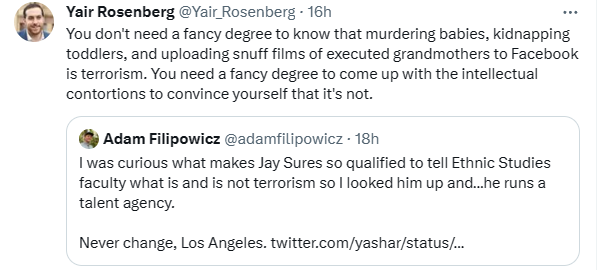
Catching up:
Because, of course. George Santos to Keep Seat After House Votes Not to Expel Him - The New York Times
Strange bedfellows update. Republicans Save Rashida Tlaib From Marjorie Taylor Greene - Newsweek
The oldest hatred. Open hatred of Jews surges globally, inflamed by Gaza war — Reuters
Meanwhile, in the Ivy League. Cornell University cancels classes Friday amid ‘extraordinary stress’ on campus after violent antisemitic threats led to the arrest of a student - CNN
When they tell you who they are. 'We will repeat October 7 again and again' - Hamas official - The Jerusalem Post
Happy Thursday.
The view from the Founders’ Valhalla
ICYMI: America’s revanchist stable genius shared some of his Deep Thoughts about History the other day. Amidst his usual rant about his various and sundry criminal prosecutions, Donald J. Trump mused about The Founders and what they might be thinking if they could see us now.
“Our Founding Fathers are looking down at Biden with scorn right now. They’re looking down at Biden and this administration with disbelief.”
We think not.1 But he raises an interesting question: What would the Founders make of the Rise and Return of Donald J. Trump?
On yesterday’s episode of the Trump Trials, Ben Wittes and I were inspired to speculate that there would indeed be high words bandied and fingers pointed among the drafters of the Constitution and the authors of the Federalist Papers.
They were vividly aware of the dangers posed by a man like Trump, and thought that they has erected effective checks and balances against him. So it is interesting to imagine what they might think as they looked down upon our current scene.
Alexander Hamilton had hoped somewhat naively that the Electoral College would afford “a moral certainty” that the office of the presidency would not “fall to the lot of any man, who is not in an eminent degree endowed with the requisite qualifications.”
He imagined that the electors would be a bulwark against men who had a talent “for low intrigue and the little arts of popularity.”
“It will not be too strong to say,” Hamilton wrote in Federalist No. 68, “that there will be a constant probability of seeing [the presidency] filled by characters preeminent for ability and virtue.”
This was, in fact a consistent theme. In Federalist No. 1, Hamilton wrote, “Of those men who have overturned the liberty of republics, the greatest number have begun their career by paying an obsequious court to the people, commencing demagogues and ending tyrants.” In Federalist No. 85, Hamilton argued that the Constitutions checks and balances were necessary to protect against the “military despotism of a victorious demagogue.”
On our podcast, Ben highlighted the most prophetic of Hamilton’s warning. In a note to George Washington in 1792, Hamilton described the proto-Trumps who endangered the Republic. It is, in fact, so on-the-nose that it was cited twice during Trump’s second impeachment trial.
Hamilton wrote:
When a man unprincipled in private life desperate in his fortune, bold in his temper, [possessed of considerable talents, having the advantage of military habits]2 —
despotic in his ordinary demeanor —
known to have scoffed in private at the principles of liberty —
when such a man is seen to mount the hobby horse of popularity —
to join in the cry of danger to liberty —
to take every opportunity of embarrassing the General Government & bringing it under suspicion —
to flatter and fall in with all the nonsense of the zealots of the day —
It may justly be suspected that his object is to throw things into confusion that he may ‘ride the storm and direct the whirlwind.’
Imagine what Hamilton might be thinking now.
**
Technically, Abraham Lincoln was not a Founder, but he also warned about the danger of demagogues and megalomaniacs. And he would undoubtedly also have some thoughts about the man who now controls his party.
The greatest threat to the Republic, Lincoln declared in his Lyceum Address, did not come from a foreign enemy.
All the armies of Europe, Asia and Africa combined, with all the treasure of the earth (our own excepted) in their military chest; with a Buonaparte for a commander, could not by force, take a drink from the Ohio, or make a track on the Blue Ridge, in a trial of a thousand years.
The real danger, he said, “must spring up amongst us. It cannot come from abroad.”
If destruction be our lot, we must ourselves be its author and finisher. As a nation of freemen, we must live through all time, or die by suicide…
He sounded the alarm about “men of ambition and talents,” who would “seek the gratification of their ruling passion, as others have so done before them.”
Take a moment to read his description of a would-be despot who “thirsts and burns for distinction.”
Is it unreasonable then to expect, that some man [possessed of the loftiest genius]3, coupled with ambition sufficient to push it to its utmost stretch, will at some time, spring up among us?
And when such a one does, it will require the people to be united with each other, attached to the government and laws, and generally intelligent, to successfully frustrate his designs.
Distinction will be his paramount object, and although he would as willingly, perhaps more so, acquire it by doing good as harm; yet, that opportunity being past, and nothing left to be done in the way of building up, he would set boldly to the task of pulling down.
**
One final thought…
If the Founders are, in fact, watching all of this, I imagine that George Mason would like to have a word with James Madison. During the Constitutional Convention, Mason warned against giving the president — any president— sweeping pardon powers. The president, Mason argued:
“ought not to have the power of pardoning, because he may frequently pardon crimes which were advised by himself. It may happen, at some future day, that he will establish a monarchy, and destroy the republic. If he has the power of granting pardons before indictment, or conviction, may he not stop inquiry and prevent detection? The case of treason ought, at least, to be excepted. This is a weighty objection with me.”
James Madison told him not to worry.
“There is one security in this case to which gentlemen may not have adverted: if the President be connected, in any suspicious manner, with any person, and there be grounds to believe he will shelter him, the House of Representatives can impeach him; they can remove him if found guilty.”
See if you can spot the flaw.
Join Us!
Our special guest will be Brian Stelter, who has a new scoop. “‘It Was Always Going to End Badly’: The Untold Story of Tucker Carlson’s Ugly Exit From Fox News.”
Quick Hits
1. Putin’s Century?
HAMAS IS AN IMMEDIATE manifestation of barbarism, and China is a true long-term challenge. But right now, the most urgent threat to the United States and a decent world order is Putin.
One hopes—one trusts—that in the twenty-first century, the arc of history will bend toward justice. But one must acknowledge that so far, the arc of the twenty-first century has bent toward Putin.
2. Next Week’s Elections Will Test Voter Mood Ahead of 2024
A.B. Stoddard on what to watch for in Ohio, Virginia, Kentucky, and Mississippi.
[Republicans] would have much to gain from victory next week. Defeating Issue 1 in Ohio would provide a reset, and signify a re-engaged pro-life voting base. And Republican wins in Virginia would create a stampede of donors begging Gov. Glenn Youngkin to make a late entrance to the GOP presidential primary—as many of them already have—and he is said to be considering it. Youngkin has bet on abortion, raising significant funds to brand his proposed fifteen-week abortion limit that makes exceptions for rape, incest, and the life of the mother. “Here’s the truth: there is no ban,” the ads claim.
Because abortion is on the ballot in both Virginia and Ohio, both parties are investing heavily in those states. Republicans in Ohio were defeated just recently on the issue in August when a ballot initiative that would have blocked this process of amending the state constitution failed by 14 points.
A flip of the state Senate that turns Virginia red would suggest “that Glenn Youngkin has threaded the needle on the abortion question and managed to come up with some Republican messaging that might very well be successful going forward into next year,” GOP pollster Whit Ayres told me.
3. The Moral Costs of Peace Now in Ukraine
AS VLADIMIR PUTIN’S VICIOUS WAR AGAINST UKRAINE continues, calls for negotiations that would grant Russia large swathes of Ukraine’s sovereign lands and control over Ukrainian citizens who live there are on the rise. The arguments for negotiating range from outright defeatism (“There is no likely path to a Ukrainian military victory”) to a misunderstanding of Ukraine’s security needs (“A cease-fire involving territorial compromise would in fact represent a very great victory for Ukraine and the West”) to an is-ought fallacy stating that one side’s war aims should be the “most likely” outcome (“Neither side is capable of a decisive military victory”). In putting forth these propositions, no consideration is given to the fact that doing so directly contravenes international law, legitimates aggression, evades accountability for war crimes, and provides no guarantees whatsoever that Moscow would respect any such agreement going forward. Indeed, surrendering territory to reward Russian aggression is an option rejected by most Ukrainians themselves, who, according to public opinion polling, show few signs of giving up the fight.
Cheap Shots
**
What’s the over-under on the number of Founders that Trump could actually name? 2? 3?
Perhaps not.
“The loftiest [stable] genius.”






I'm thankful that Charlie posted today's Morning Shots early enough that I can read, comment, and still go to my satellite radio to hear uninterrupted the premiere of the Beatles' last new song ever (Now and Then) in a few minutes. Because, bad politics, global conflicts, and the decline of our democracy notwithstanding, there are priorities.
It bears repeating that our Founding Fathers did an outstanding job overall of gifting us democracy with such a strong sense of principles and a keen understanding of what people should not gain access to positions of power. But of course they were not clairvoyant and could not foresee every eventuality. Just as insistent pests can find an entry point into even the best-guarded homes if they try often enough, bad actors can find a way to circumvent and undermine the Constitution if they find new and novel approaches and are supported by enough politicians and justices to do so. The Founding Fathers assumed that we would not willingly empower a perpetually lazy, uncouth, largely unintelligent person and that so much of the citizenry wouldn't gleefully turn its back on long held standards of morality, decency, and common sense in favor of tribalism and wanton destruction of any opposition to its own agenda. That much we have to answer for, not them, as we summarize how democracy can wither and perhaps die in a land that for so many years otherwise has been a beacon for freedom, selflessness of collective purpose, competing ideas, intellectual ambition, and enlightenment.
The Founders had direct experience of being governed by a king. 45's behavior wouldn't surprise them in the least. On a related note, George Mason sure nailed the dangers of pardons. I think the real problem with the Founders' vision was not being able to imagine how cowardly and craven Congress would become. It never occurred to them that a Senator would just give away his (and it was just "his" for the Founders) power and privilege.